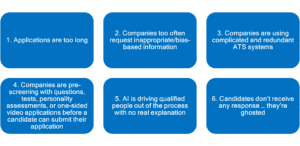Attention Talent Acquisition Leaders: YOUR RECRUITING PROCESS IS BROKEN FROM SOUP TO NUTS! Don’t believe me? The candidate experience is collectively the worst I have ever seen throughout my career. But there’s hope! Most of the problems can be fixed – IF you care about having access to the market’s best talent.
Those of you who know me and our company, Elevation Talent Group, understand that our top priority is to provide best-in-class candidate experiences, making our clientele’s experience elevated as a result. This blog is the first in a three-part series on what is broken within the application, interview, and rejection processes.
I had over 50 respondents to a questionnaire I sent out to the talent I’ve met with over the past several months, and BONUS – 95% of them are Director and above Talent Acquisition and Human Resources professionals who had a lot to say.
This first post focuses on the most common problems with the application process:
1: Applications Are Too Long
The complaints:
- Application processes are not mobile friendly
- They don’t parse information from the resume appropriately requiring tedious re-entry of information
- Way too many steps causing completing the application to take 30-45 minutes or longer in some cases
Comments from HR Professionals:
- “Applications should be under 5 minutes and mobile friendly”
- “Are cover letters even a thing? Does anyone read them?”
- “If prescreens are confusing, there is literally no way to ask clarifying questions to answer appropriately – that’s just unfair to applicants and wastes everyone’s time”
2: Companies Request Inappropriate or Bias-Based Information
- Companies are asking for graduation dates, age range, date of birth, pronouns, race, and salary expectations (when the salary range isn’t even disclosed in the posting)
- Social Security numbers, full address, references, and permission to reach out to former employers right away
My personal comments (and one from an applicant):
- “I was shocked that bias questions were brought up in over 25% of the responses I received. People want to be considered for what they bring to the table, not their demographics at the earliest stages of application”
- “The risk of identity theft is very real and 4 people shared they were asked for their social security number during the application stage (they also mentioned they abandoned the process when asked for this highly sensitive information)”
- “I backed out of an application when it asked for a social security number, references and if they could reach out to former employers right away. In my experience/opinion, that would come up at a later time”
3. ATS Systems are Too Complicated
- I’m not going to say which system was referenced most often, but one stood out far more often and was referenced in over 60% of the responses
- ATS systems often parse resumes incorrectly and repeatedly require re-entry
- Companies sometimes require applicants set up a new account every time they apply through a particular ATS system – why can’t their account be used to apply for positions at multiple companies so they don’t need to go through the same redundant process over and over again? This would also allow them to manage their applications in one place
Comments
- “Companies sometimes require mandatory information I can’t even provide – for instance, I don’t have a middle name and it’s a must to complete the application and move on”
- “ATS systems usually require you to essentially re-enter information that’s already on your resume. These systems take so much longer than necessary to complete and make it virtually impossible for someone to apply via a mobile device”
4: Too Much, Too Soon
Companies should not ask for information that is more appropriate to ask for further down in the selection process. Let’s go straight to comments on this one:
- “I’ve been asked to share a 30/60/90 plan as part of the application BEFORE any contact, as well as asked to complete text/one way video “prescreen interviews,” cognitive/behavioral/personality assessments, and a “survey” asking for responses to deep strategy questions”
- “I don’t feel like an application process should ask “interview questions” and “tell me about a time when” questions; there’s only so much you can convey in writing and may be better explained during a 2-way live phone/video dialogue”
- “For the most part I avoid jobs that require me to do something for them before they will talk to me (ex. test project)”
- “Occasionally I will get a request for a marketing plan or case study. But that is pretty rare, and I usually avoid those (I try not to work for free…). A lot of evaluations and/or personality profile type questions”
- “I have avoided assessments/video applications – terrible candidate experience”
- “Seems like a new trend, which I would advise against, is to “interview” applicants via methods other than actually screening/interviewing a candidate”
5: AI is Driving Perfectly Qualified Candidates Out of the Process
Again, our respondents said it best:
- “When I look back now, I would not apply for roles online. Leadership roles require coming out of the ATS and using people to search for people. It was a frustrating process for me being an HR leader, but one I’m thankful to have gone through as I realize how broken recruiting has gotten over the past several years”
- “I have probably applied to 60 jobs in the past 3 months. Of the jobs I’ve applied to on my own, none of them have led to an interview. I have only had interviews when I reached out to someone in my network that could help advance my resume or via a recruiter”
- “AI is not a substitute yet for the human element needed to vet applicants”
- “Using ATS software to weed out candidates instead of looking through resumes manually to see if they have the correct experience or right capacity to fulfill the role”
- “There is a whole process a candidate needs to complete in order to get past the ATS. The candidate must revise their resume and work to ensure they have the correct words to match what the ATS will look for. This way they can hopefully have their resume and application reviewed by a person”
- “Applicants invest a lot of time completing the application process and it is my belief that the application is never reviewed by a real person. There is no actual consideration given to the skills and experience of the candidate”
6: Candidates Get Ghosted
- The overall theme was that people can completely understand companies not responding to truly unqualified candidates with a personal response, but EVERY application deserves closure
- Automatic responses for people who had no business applying for the role in the first place are totally acceptable
- Out of over 50 respondents, only 2 said they receive a response more than 75% of the time. Most said they receive no response at least 90% of the time
- Response time was also alarming with only a few people saying they receive timely responses
Comments:
- “Lack of response/ghosting from some companies – at times even after an initial interview or phone screen – or an excessively long time to respond (have had a few companies take months to send a rejection email; one company took 4 months, another took 3, and one took nearly 10 months)”
- “Feeling like your time and effort is not even acknowledged half of the time”
- “No response about if I am being considered or not (one interview I received came 3 months after I applied for the job)”
What does all this mean? Your employee experience starts with the candidate experience. What can you do immediately to improve how your company welcomes high potential employees into your fold?
- Ask each of your TA/Recruiting team to take the time to go through your application process as a “ghost” applicant and consider how you would feel about each of the steps you are requiring people to go through – AND TIME IT
- Regularly audit automatically rejected applicants to ensure you are not missing out on top talent (P.S. you absolutely are missing out on top talent)
- Create different rejection messaging for talent who is clearly unqualified VS talent who missed on just a couple of criteria. Whenever possible, let those people know specifically what was missing as a courtesy
- Limit your automation to setting interviews, sending evaluations (at the appropriate time in the process after human contact), generating additional forms such as background checks/reference requests later in the process
I cannot wait to delve into the challenges in the interview part of the process from the view of the applicant next month and I would welcome feedback from TA/HR leaders in response to some of these perspectives. Please feel free to email me at heidi@elevationtalentgroup.com or message me directly on LinkedIn https://www.linkedin.com/in/lancasterheidi/



